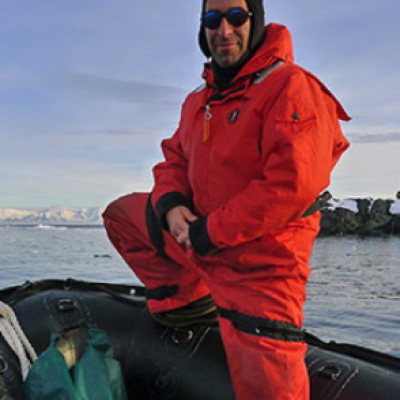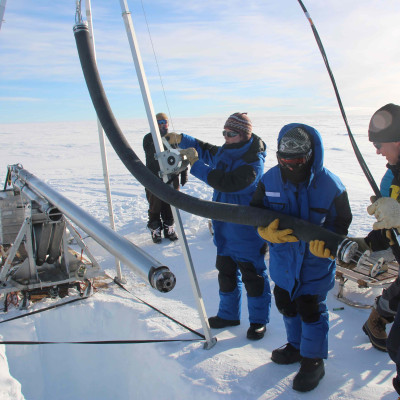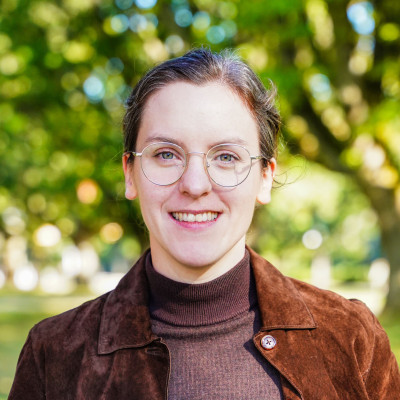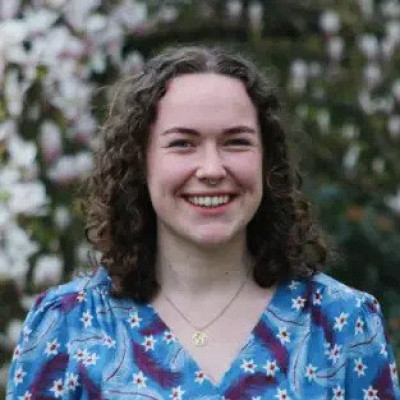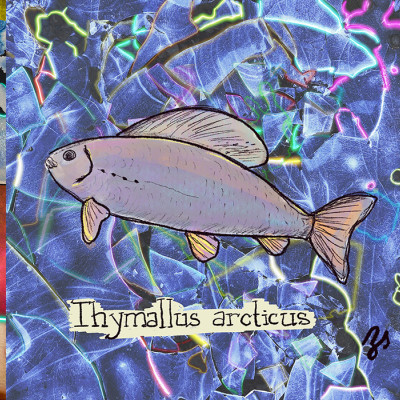News
Stay up-to-date with what's happening in EOAS
Science education and communication at sea
Last week, Professor and department head Philippe Tortell set sail for the Western Antarctic Peninsula aboard the M/V Magellan. Departing from the Falkland Islands, the ship will journey to South Georgia Island, a biodiversity hotspot rich with marine life including elephant seals and king penguins, before reaching the Antarctic Peninsula.
The expedition, chartered by WorldWide Quests, is an alumni cruise primarily focused on education and adventure. Dr. Tortell is onboard as a Science Leader and Expert and will be delivering science lectures that focus on the interactions between the Southern Ocean and Earth’s climate. These discussions include topics such as the role that carbon uptake by marine photosynthesis plays in climate regulation, and the effects of dissolved greenhouse gasses in the ocean.
In addition to his science communication and education position onboard, Dr. Tortell will monitor critical oceanographic variables, such as temperature, salinity, and surface water oxygen saturation. Temperature and salinity, measured with a Thermosalinograph (TSG) system, are used to track distinct water masses. The surface layer oxygen saturation, measured with an oxygen optode and Gas Tension Device, reveals the net photosynthetic productivity of the surface water. This is the first time such measurements will be made on the M/V Magellan, and may pave the way for future research opportunities onboard cruise vessels.
Read more about Dr. Philippe Tortell’s trip here.
Watch our interview with Dr. Philippe Tortell:
EOAS exploring the Antarctic
This month, three EOAS faculty have embarked on separate expeditions in the Antarctic.
Members of Professor Evgeny Pakhomov's lab are studying the influence of Salpa thompsoni, a gelatinous zooplankton, on the marine carbon cycle. These salps partake in one of the largest migrations on Earth as they traverse from the depths of the Southern Ocean to the surface to feed at night and return to the darker ocean layers each morning, transporting significant amounts of organic carbon with them to the deep ocean. Evgeny's team, including graduate students, Alexis Bahl and Florian Luskow, will use acoustic instruments and nets to monitor the migratory behavior of these zooplankton. Their work is sponsored by the National Geographic Society and will take place on the Alfred Wegner Institute research ship, the Polarstern. You can read more about their research here and in the Vancouver Sun.
Assistant Professor Anais Orsi will be traveling with her team to some of the coldest and windiest locations on the planet–eastern Antarctica in the Adélie Land. Here, they will investigate how strong winds shape Antarctic ice sheets and collect ice cores to study the variability of these winds over the past 100 - 200 years. Following work in the Adélie Land, Dr. Orsi and her team will travel to a site known as ‘Little Dome C’ and join efforts to extract the oldest ice core to date, hopefully containing ice over one million years old. Atmospheric gasses, such as CO2, trapped in the ice core provide a record of Earth’s climate and will be used to study shifts in the periodicity of Earth’s ice ages. Read more about their work here.
Department Head and Professor Philippe Tortell is headed to the Antarctic Peninsula by way of the Falkland Islands and South Georgia Island onboard the M/V Magellan. Onboard, Philippe will monitor the basic oceanographic features (i.e. temperature and salinity) of the surface water along the cruise track using a thermosalinograph (TSG). Philippe will deliver science lectures that focus on the interactions between the Southern Ocean and Earth’s climate, particularly as they relate to carbon uptake by marine photosynthesis and distributions of greenhouse gasses, methane and nitrous oxide, in the water column. This expedition is sponsored by WorldWide Quest and provides a unique opportunity to conduct oceanographic research during an alumni cruise that is primarily focused on education and adventure. You can read more about his trip here
New in EOAS: Lindsay Nelson – Earth Science Educational Field and Laboratory Coordinator
Meet Lindsay Nelson, our Earth Science Educational Field and Laboratory Coordinator! Lindsay started her position in September this year and we are excited to have her in our “New in EOAS” series.
Q: Would you like to tell us a bit about yourself?
LN: I completed a Bachelor’s degree in Earth and Planetary Sciences at McGill University. After that, I worked in mineral exploration in northern Canada for about 8 years. I’ve worked at many different sites for short term projects, but I also spent multiple years on one exploration property eventually doing work such as data integration and geological modeling. I watched the project change and grow to an advanced exploration stage, which was very interesting.
Q: What do you think is the most memorable experience in your career so far?
LN: One of my biggest takeaways from being a geologist is that there is a difference between what you learn about geology in field school or in class – where you are just with your peers – versus when you start working. There is a combination of very different people in a camp; you have not only geologists but also drillers, mechanics, cooks, archaeologists, biologists, and so on. Everyone has different backgrounds and experiences but need to find ways to collaborate and live together. I’ve been able to get to know people that I probably wouldn’t have met in my life outside of the field and you can learn a lot from each other while working together.
Lindsay collecting samples of glacial sediments in NWT
Q: What drew you to this position?
LN: I saw the position was related to student labs and field schools and was immediately interested. Earth Science training is very special to me because there are so many opportunities for hands-on experiential learning. Lab projects and field trips are what I still remember most about my time as a student, and I was excited about the chance to support students and instructors with these aspects of their programs.
Q: Do you expect that there might be some differences between this position and your previous experience in mineral exploration?
LN: Definitely. There are some transferable skills, such as organization, logistics, communication, data management, and sample collection. However, the university setting is very different from the industry setting. For example, I provided training to other geologists and technicians when I worked in mineral exploration, which is the closest I got to an “educational” experience, but that was usually for a specific job with people who already had a lot of Earth Science knowledge. In EOAS, there are students at many different stages in their education, and that are studying a wide range of subjects, not just geology.
Q: How do you view your role at EOAS?
LN: This is a new position in the department and a new role for me as well, so we are still in the process of figuring out what exactly it involves. It is exciting to figure out how I can best help in this position. I do not have a “typical” work day so far, but I am learning about, for example, what labs are happening this term and what kind of collections we have here. I am also talking with faculty about field trips they are planning and I am helping organize for that. It has been a fairly dynamic position, I would say, as it depends on what courses are running and what they need.
Q: What are you doing this term?
LN: This term my work is more related to the current courses with lab components, and learning about the department in general. I am making sure that the teaching assistants have what they need and that the equipment for labs is working, and tracking samples that are missing. In the longer term, I am planning to get more integration across different sample and equipment collections: find out what samples are available and help share them between courses, etc. I hope there will be more flexibility in the usage of the materials with my organization and coordination. So far, I am starting with basic inventories to familiarize myself with the available collections, since there is so much history and legacy here.
Q: That sounds cool! What is the oldest sample you can find you here?
LN: I do not know about the oldest here, but I found a sample that was collected in 1922. There are also handwritten index cards with all the sample information including sketched maps in some cases. Just recently, I found an Optical Mineralogy textbook from 1933 in one of our teaching labs. It is still kept in the prep room as a reference book because the basic information is still relevant. The collections we have here are amazing and some of them are irreplaceable!
Q: You mentioned organizing field schools in the near future. What do you plan to do?
LN: I’ve been helping with some of the logistics and safety aspects of trips. The field opportunities are so valuable but there is a lot of work to set them up. The professors and TAs are already very busy, so part of my role is to help facilitate field trips and field courses so that the students can get the most out of these experiences.
Q: What do you hope to achieve in the next few years at EOAS?
LN: One of my ultimate goals is to help students learn well by providing them with a lot of great samples. I want to make it easier for people to know what samples are available in the collections. For the fieldwork side, I want to bring my personal experience as a field geologist to the courses because there are key differences between learning about geology and being a working geologist. I am looking forward to joining the field trips because it is not only always a fun experience, but also an experience for me to keep learning too. Since most of my work was in northern Canada, there’s a lot I don’t know about the local geology here. I want to not only support these field projects but also learn more as well.
Q: What do you do on the weekend?
LN: I’m into gardening, mostly growing food and flowers. I like to grow plants for pollinators. I also have an interest in soil and soil science, so I’ve been using that knowledge to improve the soil in my garden. Last year I put in more perennials, as I knew I would be busy in the field during the summer and they’re less work than vegetables. That said, I did also grow a lot of different chilis– they did ok even with the cold spring this year!
Meet Ruth Moore - Geophysicist
Ruth is an MSc student in Geophysics at UBC, under the supervision of Dr Anaïs Orsi. She is looking at the changing climate of the Western Canadian Arctic, with a particular focus on the changes to the atmospheric water cycle. Understanding how the Arctic is changing is relevant to to our overall understanding of atmospheric dynamics, Arctic climate and will bring a greater knowledge of climate change to the people of the region, informing adaptation strategies.
Before coming to EOAS Ruth did her undergraduate degree at University College Dublin, Ireland, where she studied Astrophysics. She is passionate about increasing diversity within Earth Science and working to make science more accessible.
2022 Larkin Lecture: relationships between Indigenous sovereignty and freshwater fish futures
Critical Freshwater Fish Futures: using interdisciplinary and arts-based research approaches to engage relationships between Indigenous sovereignty and freshwater fish well-being
https://oceans.ubc.ca/2022-larkin-lecture/?login
Dr. Zoe Todd of the Department of Sociology and Anthropology at Carlton University will be speaking on the relationships between Indigenous sovereignty and freshwater fish futures in Canada, with an explicit focus on ongoing community-driven interdisciplinary research partnerships in Alberta, Saskatchewan, and Ontario. Drawing on decades of scholarship in the discipline of Critical Indigenous Studies that centres Indigenous sovereignty to elucidate relationships between Indigenous peoples and colonial nation-states and entities in Canada, this talk examines how an unambiguous engagement with Indigenous sovereignty, as understood through Indigenous legal orders and legal-ethical practices in Canada and internationally, can strengthen efforts to protect at-risk aquatic species and watersheds across the country. The use of arts-based research-creation approaches will be examined to help illustrate dynamic cross-disciplinary and pluralistic approaches of documenting, engaging, and upholding plural governance principles grounded in Indigenous sovereignties across many different homelands.
Dr. Zoe Todd (she/they) (Red River Métis) is a practice-led artist-researcher who studies the relationships between Indigenous sovereignty and freshwater fish futures in Canada. As a Métis anthropologist and researcher-artist, Dr. Todd combines dynamic social science and humanities research and research-creation approaches – including ethnography, archival research, oral testimony, and experimental artistic research practices – within a framework of Indigenous philosophy to elucidate new ways to study and support the complex relationships between Indigenous sovereignty and freshwater fish well-being in Canada today. They are a co-founder of the Institute for Freshwater Fish Futures (2018), which is a collaborative Indigenous-led initiative that is ‘restor(y)ing fish futures, together’ across three continents. They are also a co-founder of the Indigenous Environmental Knowledge Institute (IEKI) at Carleton University (2021). They were a 2018 Yale Presidential Visiting Fellow, and in 2020 they were elected to the Royal Society of Canada’s College of New Scholars.
The event will be a hybrid session taking place over zoom and in room the AERL Theatre (Rm. 120, 2202 Main Mall) at 6pm Nov 16.
RSVP to the event and the post-talk reception here
Please note: UBC recommends masks be worn in indoor settings. Masks are especially recommended for those attending this session in-person, due to immunocompromised VIP. Masks and hand sanitizer will be available on site.
An expedition to one of the windiest places on Earth
This month, EOAS assistant professor Anais Orsi and her team are headed to site D47 within the Adelie Land, one of the windiest places on Earth. The harsh conditions of the site, located on the steepest slopes of Antarctica, are precisely what brings the team to D47, where they will be investigating how strong winds shape Antarctic ice sheets and how gasses trapped in ice cores can be used to reconstruct previous wind conditions over the past 100 - 200 years. Scroll down to watch our interview with Dr. Orsi.
The fierce winds at site D47 form when very cold, dense air coming from the center of the continent falls down the steep slopes, creating what is known as ‘katabatic’ winds. These winds pick up and carry snow over the surface of the ice, forming snow dunes in their wake called sastrugi. While the size and orientation of the sastrugis indicate the direction and strength of the winds, they also cause the accumulation of snow over the ice sheet to be patchy, making it difficult to interpret shallow ice cores. As the winds continue to blow downhill, the air warms up and can hold more water vapor, causing the snow carried by the wind to evaporate. While it is clear this process results in a net loss of mass from the ice sheets, it is not yet clear how important this effect is on the ice sheet. Orsi’s team will study these effects using a water isotope laser spectrometer supported with an array of meteorological instruments to measure turbulence caused by the wind and associated moisture transport.
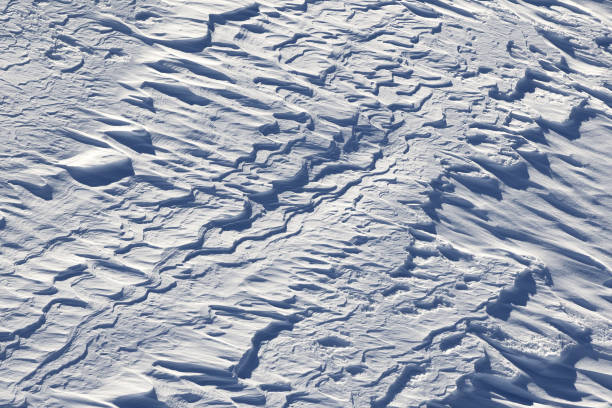
A sastrugi formed in the Canadian Arctic. (Stock image)
To examine the longer term variability of katabatic winds, the team will extract 150 - 200 meter ice cores containing ice up to 100 - 200 years old. Air bubbles are trapped within the cores due to the porosity of surface snow, and contain a combination of lighter and heavier gas elements. When winds are calm, the heavy gasses sink to the bottom of the snowpack. By looking at the distribution of light and heavy gasses recorded in the ice core, Dr. Orsi hopes to reconstruct a timeline of previous strong wind events. These measurements will be the first of their kind, potentially providing greater understanding of katabatic wind variability over time.
Following phase one of the expedition, the team will trek through the continent to a slightly less windy study site known as ‘Little Dome C’ where they will join fellow paleoclimatologists. Despite the milder winds, Little Dome C is even colder than D47, with temperatures as low as -40oC. The oldest ice core to date, containing ice over 800,000 years old, was extracted from Little Dome C. However, paleoclimatologists are hoping to find even older ice to study the causes behind the changes in Earth’s ice age cycle periodicity. Previously, ice age cycles were regularly spaced every 41 thousand years, but since the mid-pleistocene transition, 1.5 to 1 million years ago, they have become more intense (colder), but less frequent, returning every 100,000 years. CO2 and other atmospheric gasses trapped in the ancient ice contain clues that can reveal the changes in Earth’s climate that precipitated this shift in ice age cycles. Dr. Orsai’s team will contribute to the project by characterizing how gasses become trapped in the ice at this particular site and how the milder winds affect the surface ice topography in this region.
